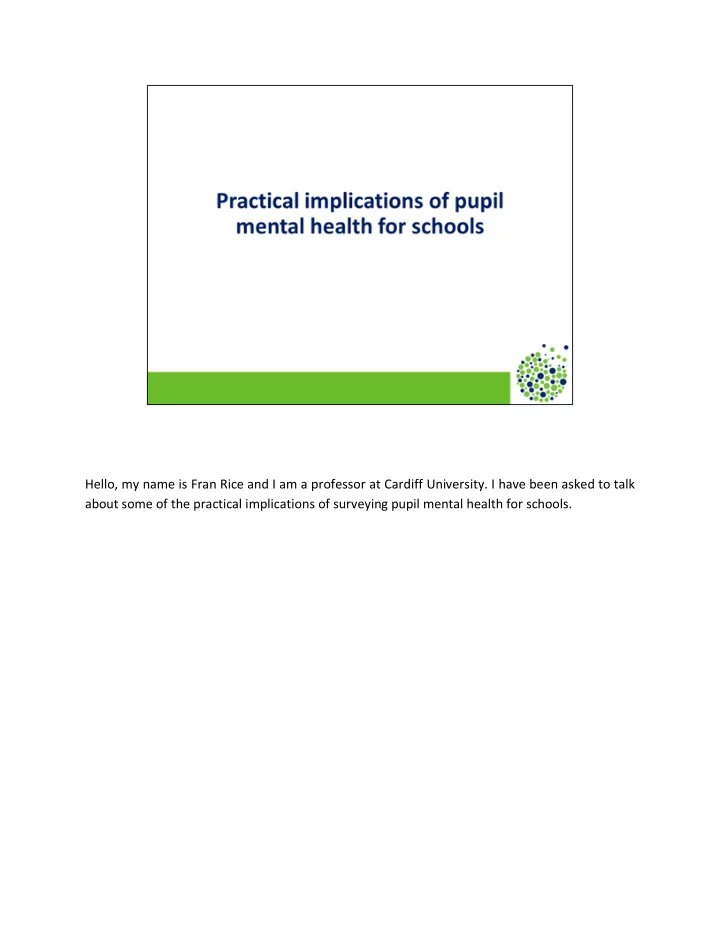

Hello, my name is Fran Rice and I am a professor at Cardiff University. I have been asked to talk about some of the practical implications of surveying pupil mental health for schools.
The first thing to say for surveys of this kind where young people report on their current symptoms, their strengths and difficulties with mental health, is that the vast majority of students are doing well in terms of their mental health and are not showing overt difficulties in this area. It is also true to say that a minority of students, around 1 in 8, will show difficulties and have some ongoing, current symptoms or elevated symptoms of difficulties in a particular domain, for instance, feeling anxious. It is also true that students who have difficulties in one area will often have another difficulty in another domain, called comorbidity, and this is common. For instance, some young people may have difficulties with emotions (e.g. feeling anxious), but they may also have difficulties in paying attention and show some signs and symptoms of hyperactivity. They tend to go together in the same individuals.
Research shows that teachers and others that know young people well, are pretty good at identifying students who are showing difficulties with conduct problems or with hyperactivity and inattention. What is more difficult for teachers and others to detect in young people are difficulties with emotional problems, particularly in the absence of other difficulties, and so these can tend to be missed. This is the value of asking young people to report on their current symptoms, because it gives you a sort of internal spotlight into what is going on in a young person’s mind at that moment in time.
What can schools and those who work in schools do to support young people’s mental health? Where young people do have some symptoms of having difficulties with their wellbeing or mental health, it is important not to panic and to bear in mind that it is really common for young people to have some challenges and to experience some difficulties with their mental health at some stage in their development, particularly during adolescence, because it is this period during which symptoms of emotional difficulties and anxiety, low mood, depression and also some conduct difficulties can emerge. These have complex sets of causes, which can be multi-factorial. Some will be biological, so certain children will be born with propensities, while other causes may be more to do with the context of young people’s lives and the things that are happening in their lives currently. Some young people’s difficulties can resolv e spontaneously given time; so some elevated symptoms of mental health difficulties (e.g anxiety, depression or conduct difficulties) can be time limited and are partly driven by the current circumstances or challenges that might be happening in young peop le’s lives. It is not unusual to have one-off episodes of elevated symptoms, particularly at adolescence. But other young people with mental health difficulties will require additional help and support. There are various different routes and ways of providing this and it will differ slightly depending on the type of problem and severity of the difficulty.
Simple things can be really helpful and there are many things that can be done that you don’t need to be a mental health expert to be able to do. One of these is really thinking about how every contact with a young person counts. You can’t underestimate th e value of taking time to ask a young person how they are, listening to them in a non-judgmental way, being there to support them. This is often referred to by medics as ‘watchful waiting’. Much like a clinician will assess and monitor a young person over time for depression, doing these simple things is also an effective way of treating mild depression. As you probably already know, the vast majority of young people who meet the criteria for having an overt mental health disorder that causes functional impairments in their daily lives, will not seek help for their problems, but those that do, will most often seek it from their teachers. Surveys have shown how young people really value the help and support that they receive from their teachers, so it really is important to not underestimate the value of this. Nevertheless, this does take time, which needs to be planned for, particularly as part of people’s workloads and workload allocations.
School staff can support mental health through promoting a culture and environment which supports and values prosocial behaviours and principles. An environment where people help and support each other not only benefits young people’s mental health but it also makes it a nice place to work in. There are two very large scale, high quality randomised controlled trials that provide evidence to support this, one based in India and another in England. They have demonstrated how activities that promote a participative environment for young people (e.g. involving young people in decision making about what happens in their class and school) and activities that aim to improve relationships between students and staff, and among students, bringing people together to help create an environment where young people have a voice, w hich studies continue to show has a beneficial effect on young people’s mental health.
Finally, it is crucial to remember that there will be a small number of young people who are experiencing complex difficulties that really require additional support and help from more specialised services; for example, school counsellors, specialist child and adolescent mental health services and sign posting young people to go to their GP who can refer them when necessary.
Recommend
More recommend